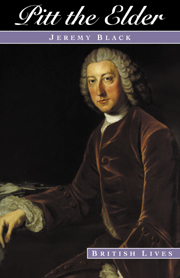2 - A very inflammatory politician: the rise to high office, 1735–1756
Published online by Cambridge University Press: 30 September 2009
Summary
Foremost in ardent Patriot-Bands you stood,
A firm Opposer for the Public Good.
An Epistle to William Pitt (1746)CRITIC OF WALPOLE
It is said they don't intend to turn out anybody in the King's service who voted … for the Prince in either House. If they don't, I think that shows some fear: for Sir Robert in the House of Commons in the debate where it was taken notice of the shameful things they had done in turning out officers of great merit, said that a minister must be a very pitiful fellow if he did not turn out officers who pretended to meddle with the civil government.
Sarah, Duchess of Marlborough, 3 March 1736It was largely thanks to Walpole that Pitt was to be a great war minister who never fought in the field, unlike Churchill with whom it has been fashionable to compare him. Pitt was born during one war, that of the Spanish Succession (1702–13), rose to prominence during the next major conflict, that of the Austrian Successsion (1743–8), to fame during the next, the Seven Years War (1756–63) and died during the following conflict, the War of American Independence (1775–83). War provided him with political opportunities and reputation. And yet he never saw combat, while his career in the army ended after five years. Walpole was essentially responsible for the fact that Pitt never fought and for the loss of his military position.
- Type
- Chapter
- Information
- Pitt the Elder , pp. 31 - 128Publisher: Cambridge University PressPrint publication year: 1992

